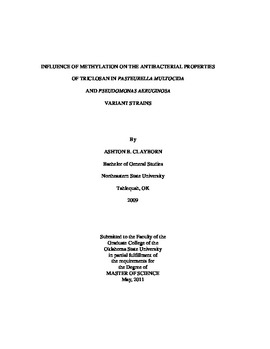| dc.contributor.advisor | Champlin, Franklin R. | |
| dc.contributor.author | Clayborn, Ashton B. | |
| dc.date.accessioned | 2014-04-15T18:38:05Z | |
| dc.date.available | 2014-04-15T18:38:05Z | |
| dc.date.issued | 2011-05-01 | |
| dc.identifier.uri | https://hdl.handle.net/11244/8533 | |
| dc.description.abstract | The opportunistic bacterium <italic>Pasteurella multocida</italic> is extremely susceptible to the hydrophobic biocide triclosan by virtue of its markedly permeable outer membrane, while the opportunistic pathogen <italic>Pseudomonas aeruginosa</italic> is intrinsically resistant to levels far exceeding the triclosan aqueous solubility limit. Widespread incorporation of triclosan in health and personal care products has resulted in its concomitant accumulation with metabolites such as methyl triclosan in environmental and biological systems. The present study was undertaken to investigate the possibility that methylation of triclosan may mitigate its efficacy and represent a potential resistance mechanism. Comparative standardized disk agar diffusion and batch cultural turbidimetric bioassays were employed to assess the relationship between triclosan susceptible or resistant bacteria and methyl triclosan. A wild-type <italic>P. aeruginosa</italic> parental strain and a mutant exhibiting a permeable outer cell envelope phenotype were examined in concert with a refractory wild-type strain sensitized to triclosan susceptibility using outer membrane permeabilizer compound 48/80. Gram-positive organisms were also evaluated to further assess the possibility of a role for the gram-negative outer membrane in the inability of methyl triclosan to affect bacterial growth. All organisms examined were resistant to methyl triclosan, while all organisms excluding <italic>P. aeruginosa</italic> were susceptible to triclosan over a wide concentration range. The permeable outer membrane phenotype in both mutant and chemically-sensitized wild-type strains rendered <italic>P. aeruginosa</italic> susceptible to triclosan, but not methyl triclosan. These data support the notion that methylation of triclosan renders the compound unable to inhibit the growth of disparate bacterial pathogens in a manner independent of an intact outer membrane. This is substantiated by the fact that gram-positive bacteria do not possess an outer membrane and exhibit no inhibition of growth in the presence of methyl triclosan. It can also be postulated that biocide modification may contribute to the intrinsic resistance of <italic>P. aeruginosa</italic> to triclosan. | |
| dc.format | application/pdf | |
| dc.language | en_US | |
| dc.publisher | Oklahoma State University | |
| dc.rights | Copyright is held by the author who has granted the Oklahoma State University Library the non-exclusive right to share this material in its institutional repository. Contact Digital Library Services at lib-dls@okstate.edu or 405-744-9161 for the permission policy on the use, reproduction or distribution of this material. | |
| dc.title | Influence of Methylation on the Antibacterial Properties of Triclosan in Pasteurella multocida and Pseudomonas aeruginosa Variant Strains | |
| dc.type | text | |
| dc.contributor.committeeMember | Picking, Wendy L. | |
| dc.contributor.committeeMember | Kohler, Gerwald A. | |
| osu.filename | Clayborn_okstate_0664M_11346.pdf | |
| osu.college | Agricultural Sciences and Natural Resources | |
| osu.accesstype | Open Access | |
| dc.description.department | Department of Biochemistry and Molecular Biology | |
| dc.type.genre | Thesis | |
| dc.subject.keywords | biocide | |
| dc.subject.keywords | methyl triclosan | |
| dc.subject.keywords | pasteurella multocida | |
| dc.subject.keywords | pseudomonas aeruginosa | |
| dc.subject.keywords | resistance | |
| dc.subject.keywords | triclosan | |
